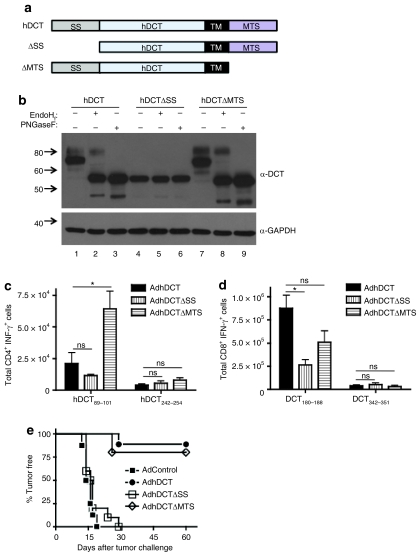Figure 3.
Immunization with AdhDCTΔSS, which is glycosylation-defective, but not AdhDCTΔMTS, abrogates CD4+ T cell–mediated tumor protection while T-cell responses to the known helper CD4 epitopes are maintained. (a) Schematic representation of the hDCTΔSS and AdhDCTΔMTS variants (SS, endoplasmic reticulum signal sequence; TM, transmembrane domain; MTS, melanosomal transport signal). (b) Western blot analysis reveals lack of mature N-linked glycosylation in hDCTΔSS variant, but not AdhDCTΔMTS variant. 293T cells were transfected with plasmid DNA expressing hDCT, hDCTΔSS, hDCTΔMTS, or GFP for 24 hours. Lysates were prepared in RIPA lysis buffer and equal amounts of protein (~20 µg) were treated with the glycosidase enzymes EndoHf or PNGaseF for 24 hours at 37 °C. The entire reaction was diluted in 2× gel loading buffer and resolved by 10% SDS-PAGE. DCT was probed for using α-TRP-2 (C-9) and developed by ECL, followed by reprobing with α-GAPDH as a loading control. (c,d) T-cell responses to the known (c) CD4 epitopes (hDCT89–101 and hDCT242–254) and (d) CD8 epitopes (hDCT180–188 and hDCT342–351) were assessed via intracellular cytokine staining. Results are shown as mean ± SEM from 10 mice pooled from two separate experiments and represent the absolute number of antigen-specific cells per spleen (*P < 0.05 compared to AdhDCT; NS, not significant). (e) CD8-deficient mice (n = 10–15) were immunized intramuscularly with 108 plaque-forming units of AdControl, AdhDCT, AdhDCTΔSS, or AdhDCTΔMTS. Mice were challenged subcutaneously with 2 × 104 B16F10 cells 7 days after immunization.

